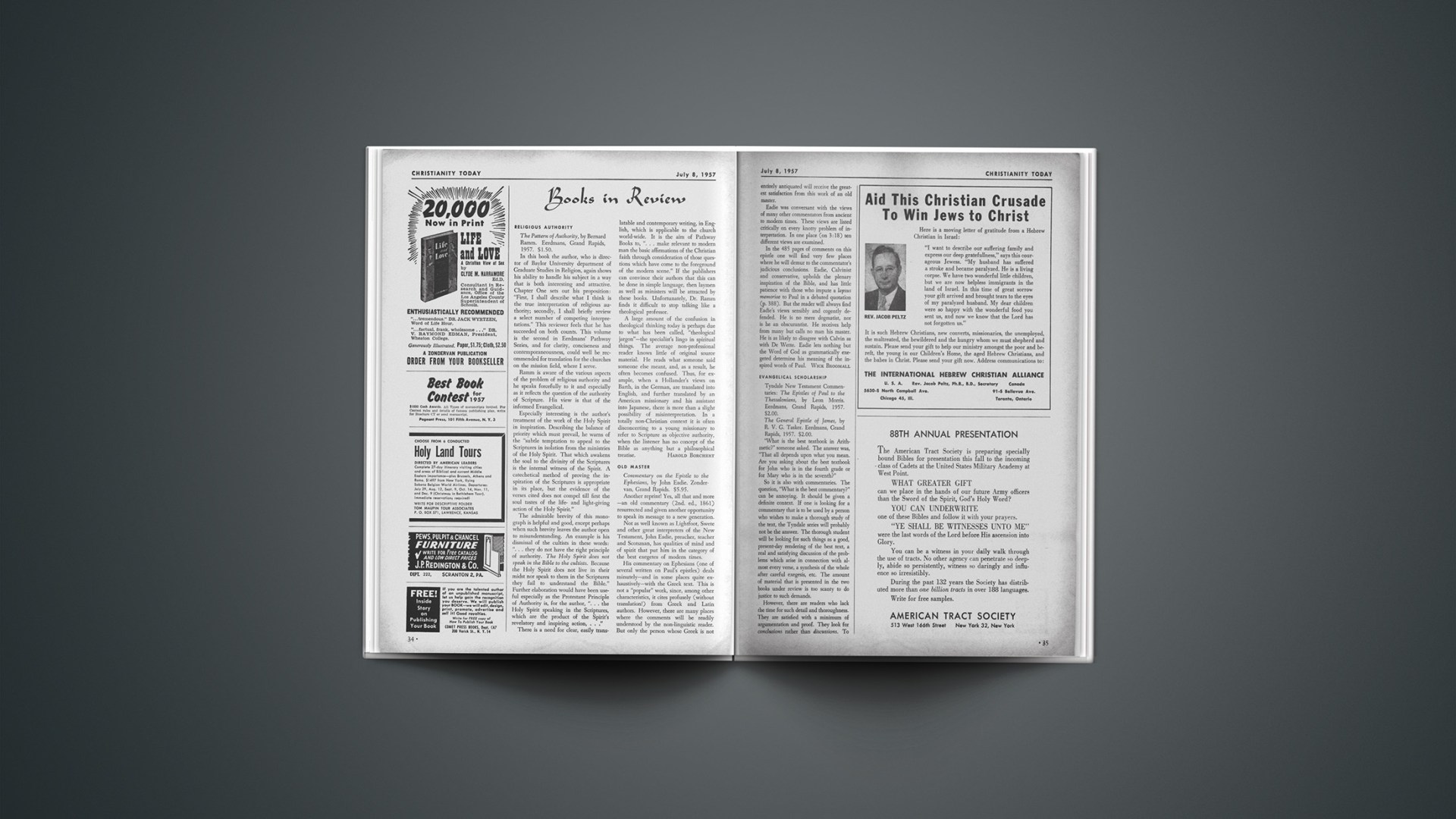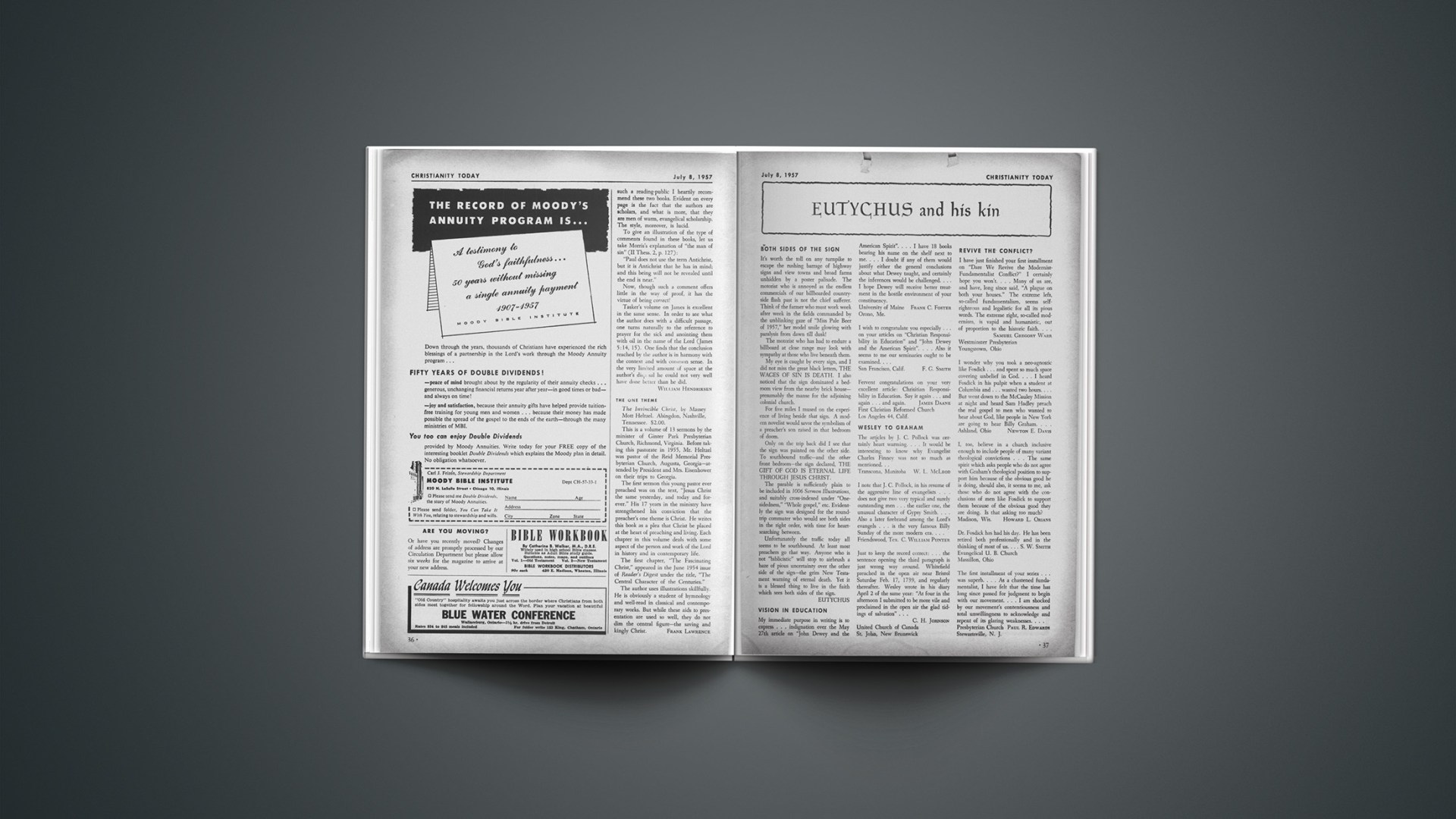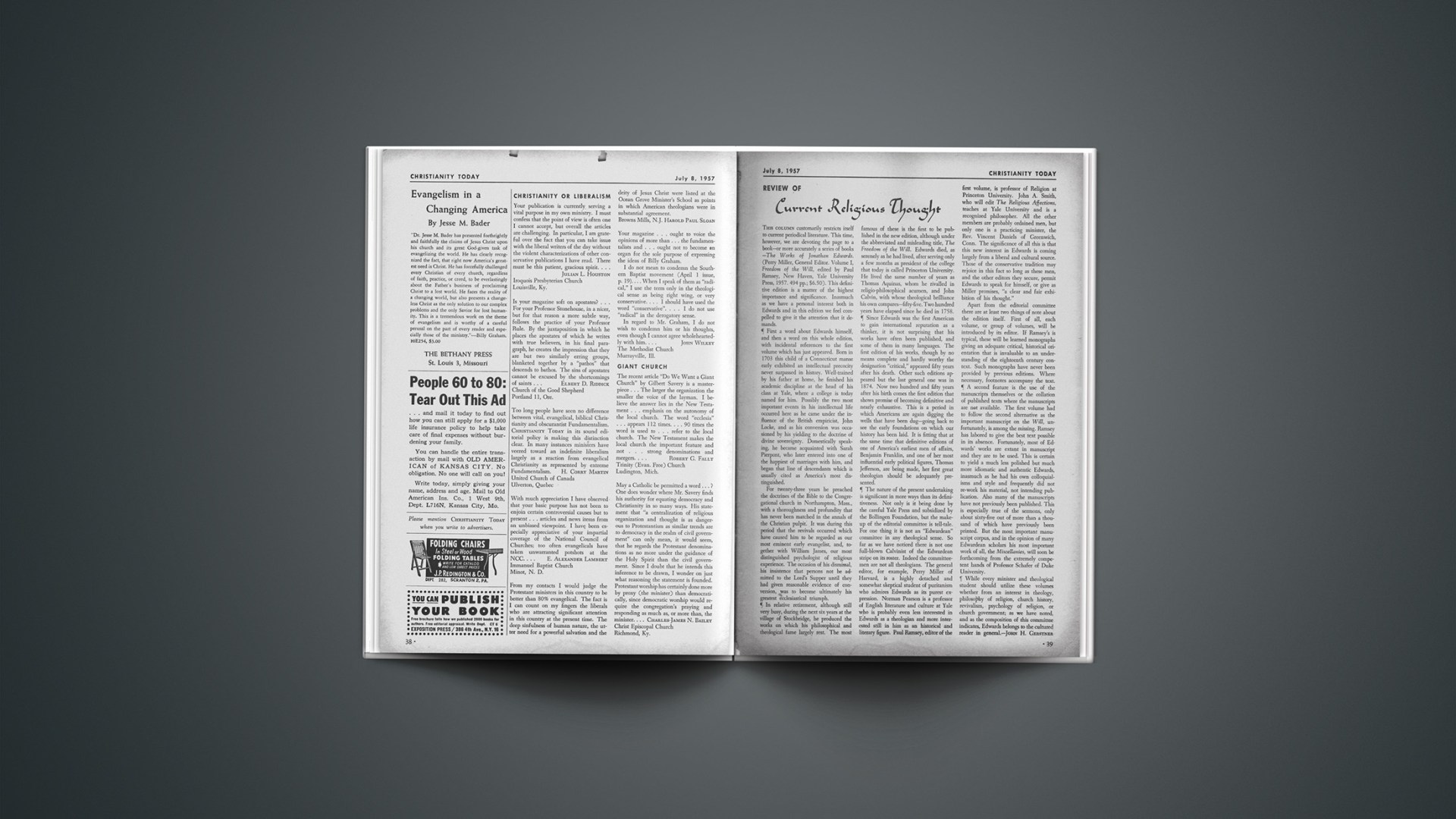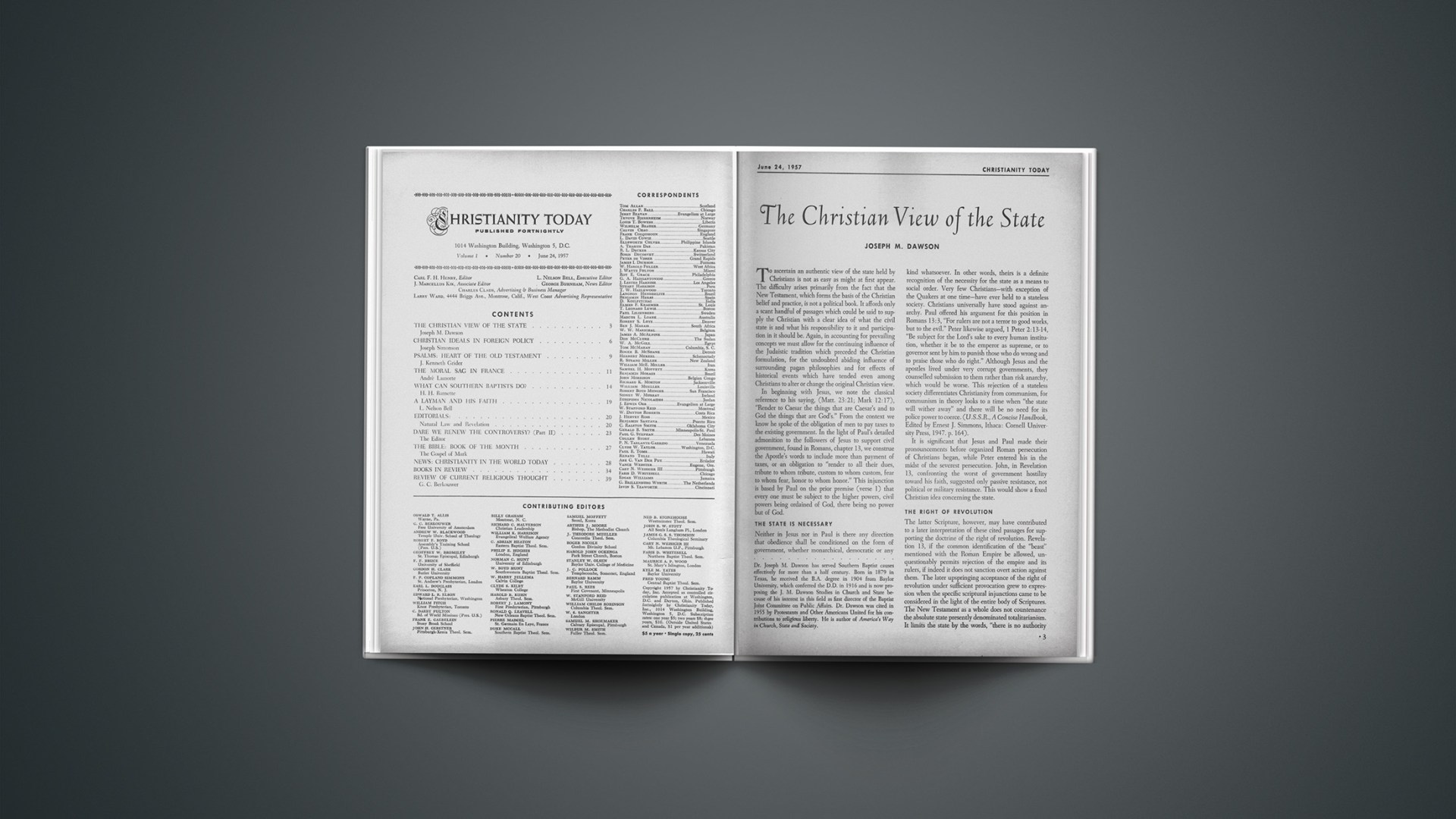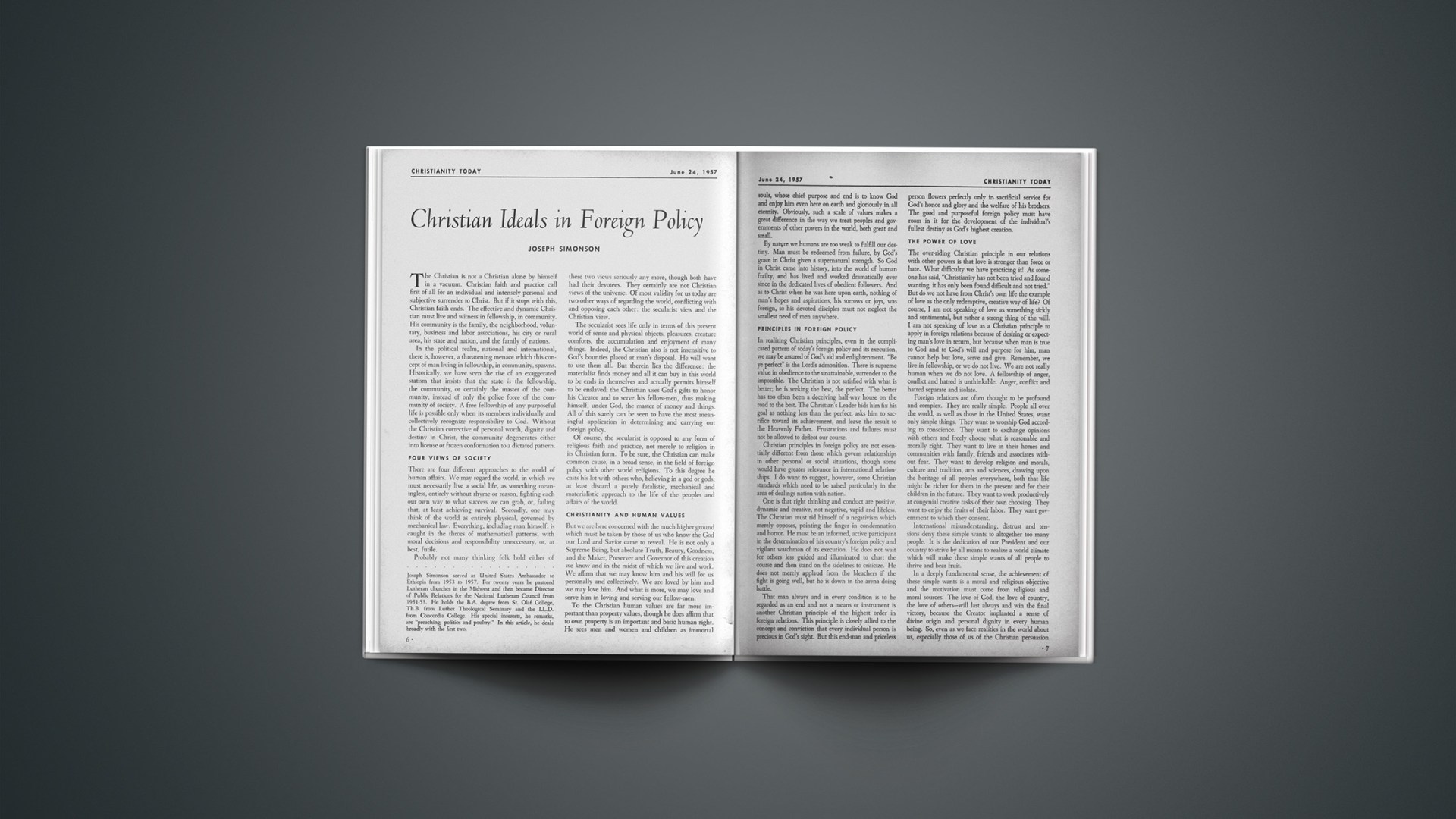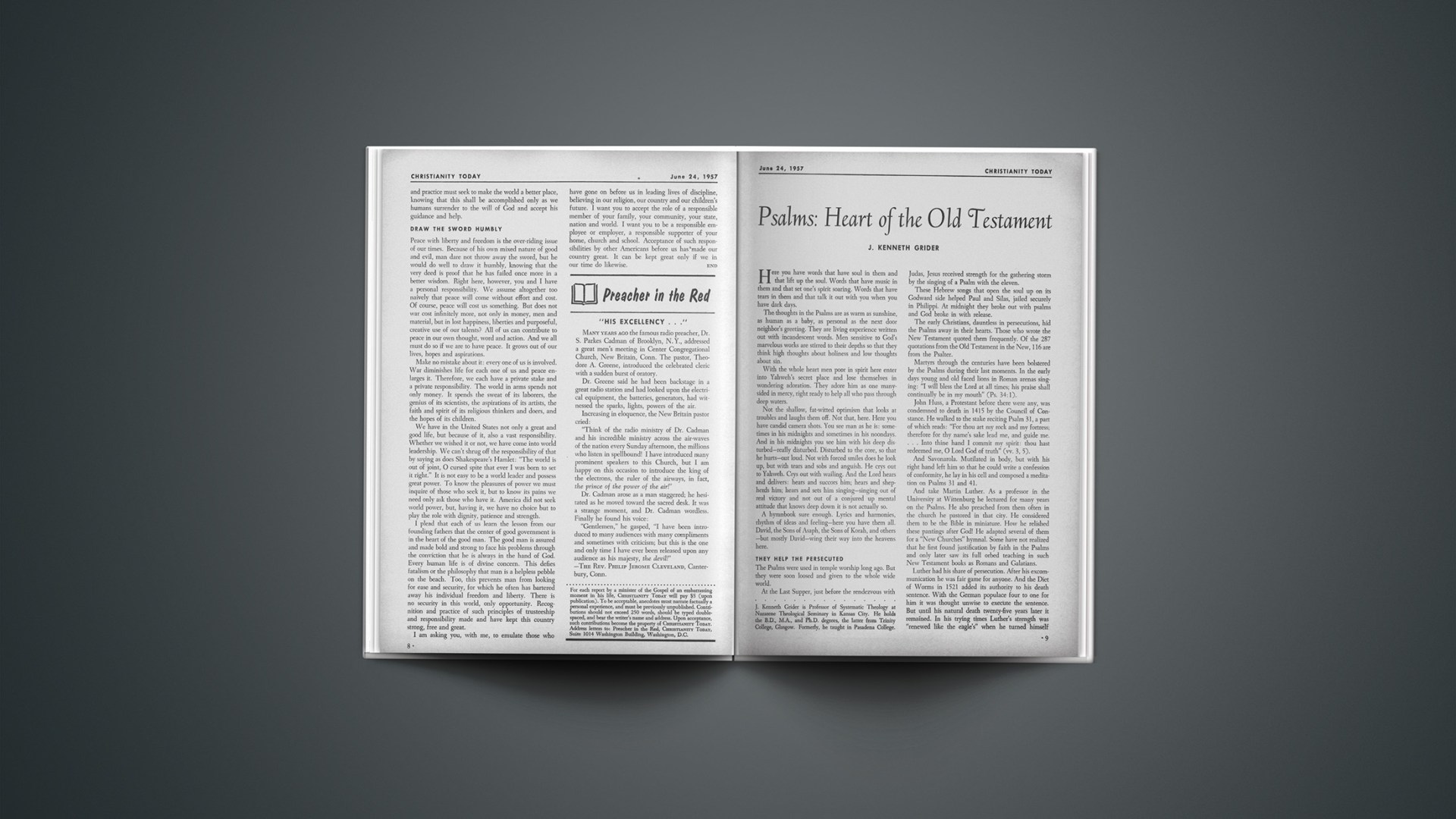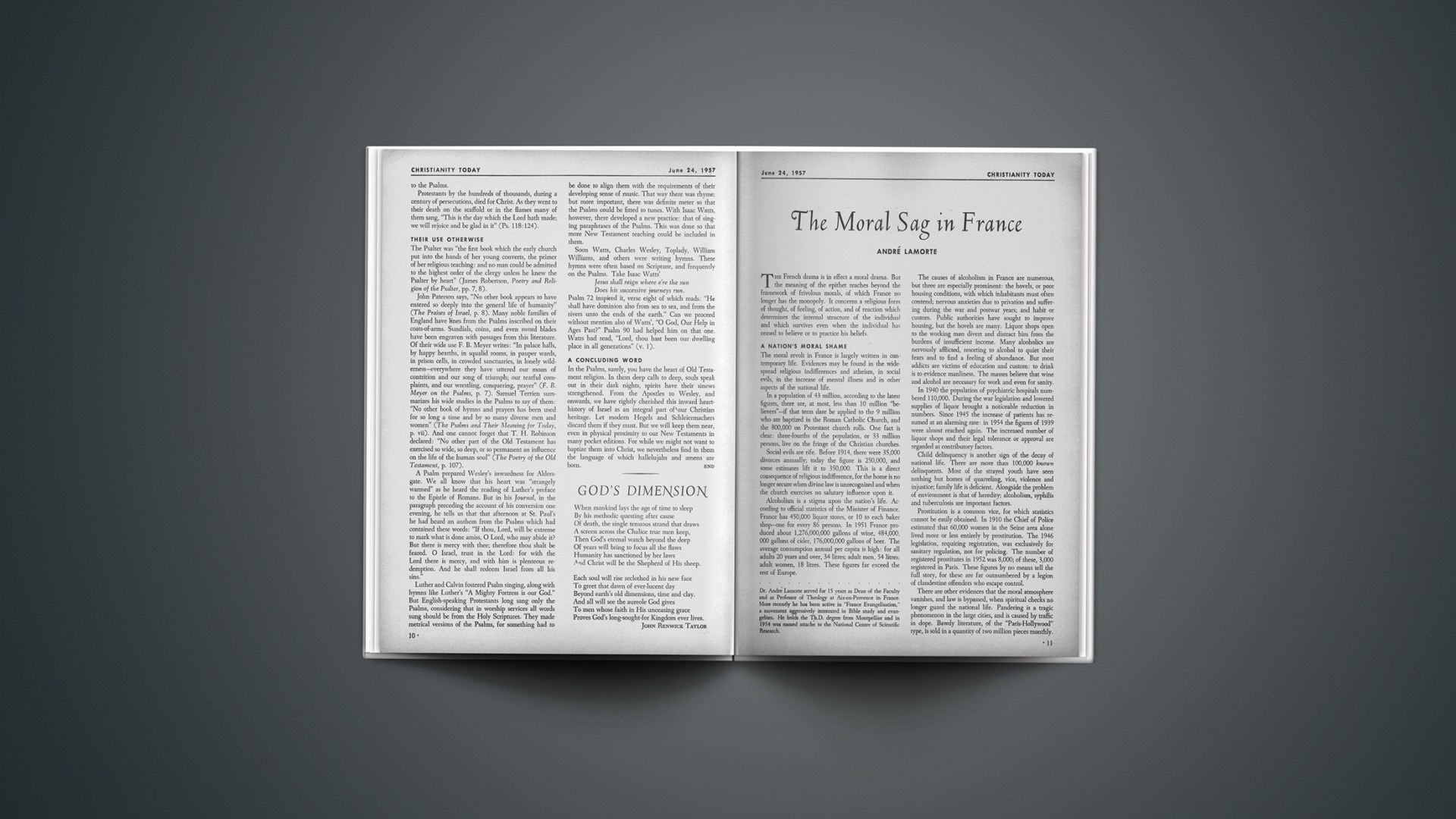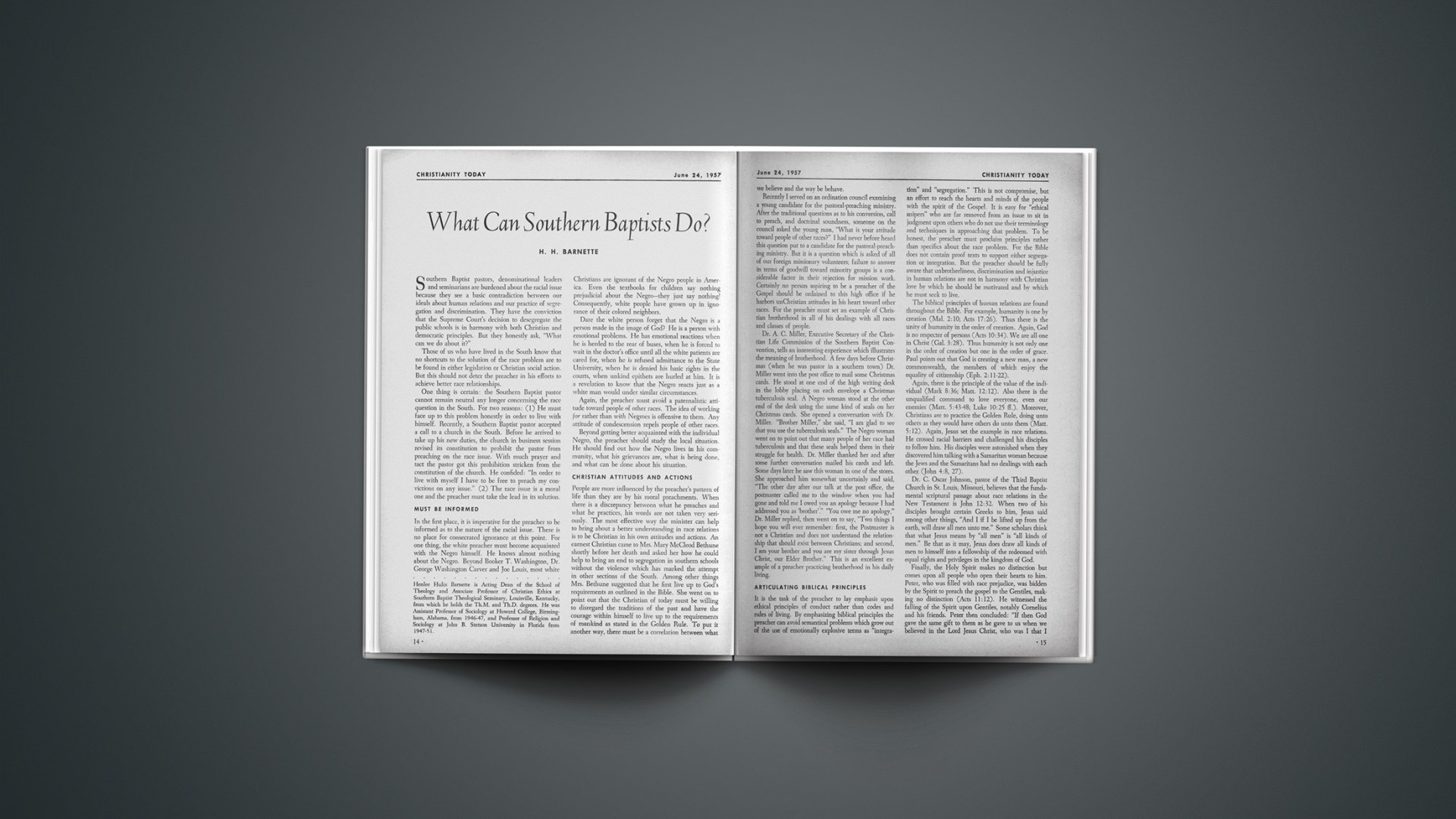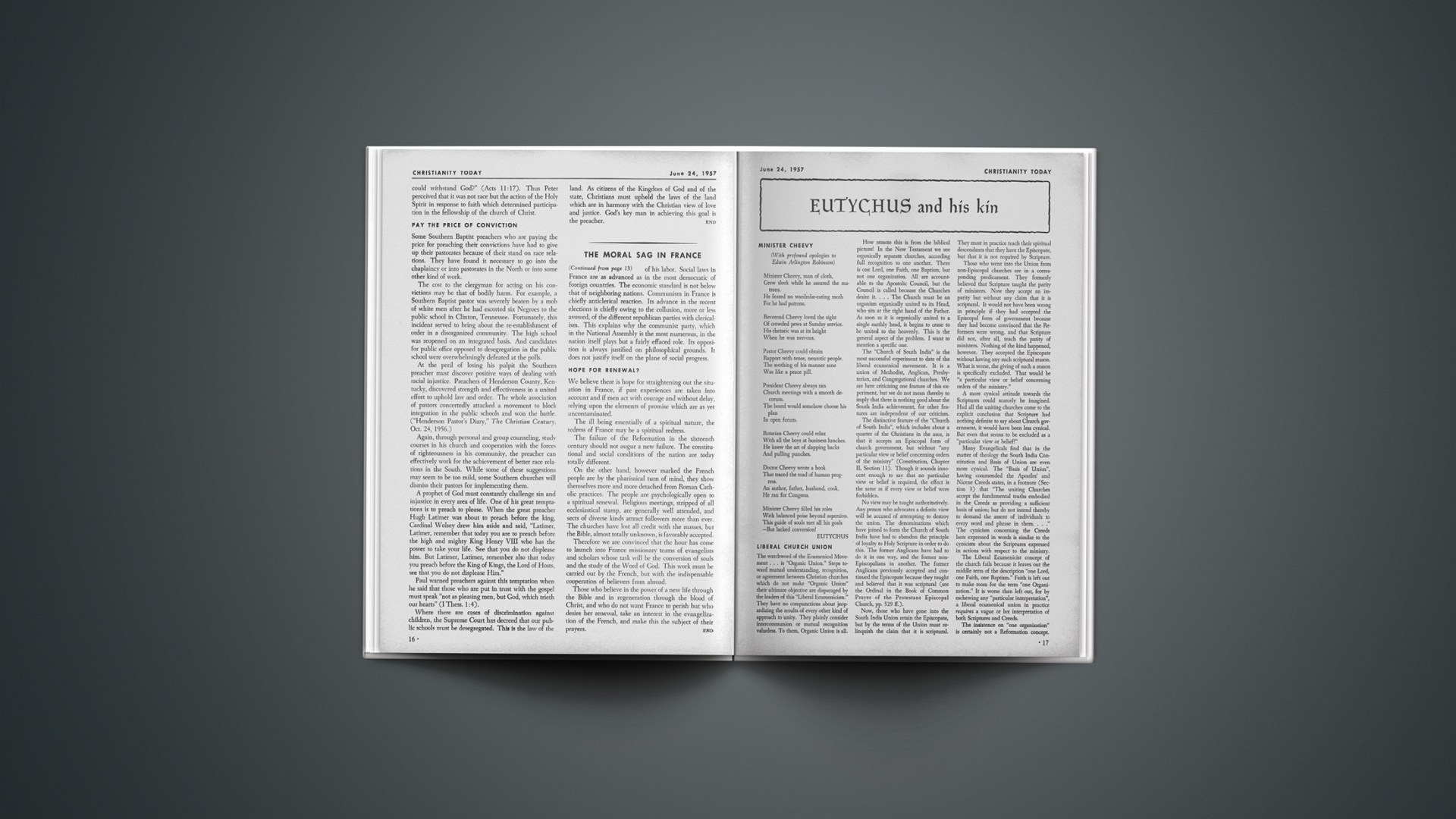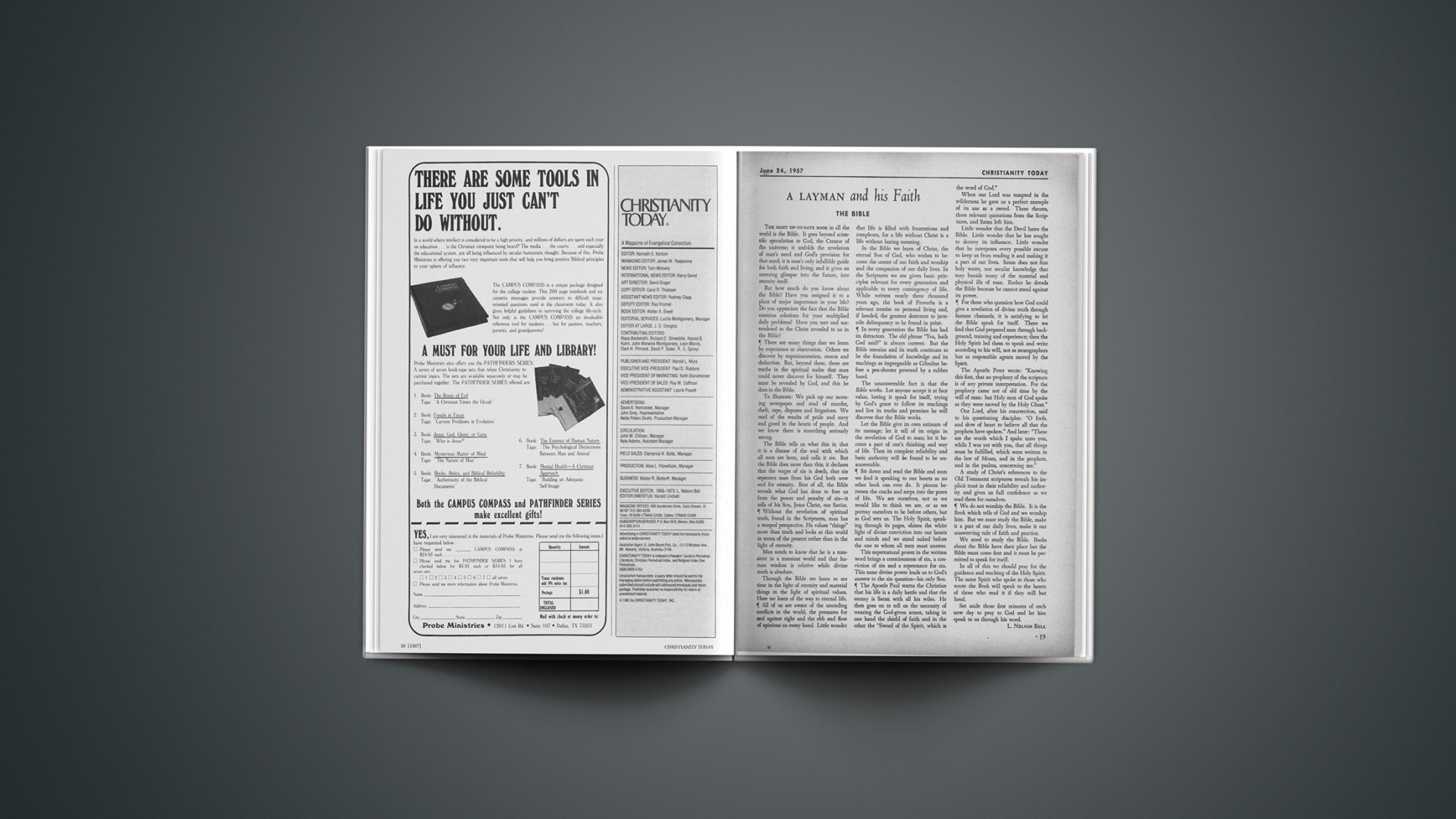Religious Authority
The Pattern of Authority, by Bernard Ramm. Eerdmans, Grand Rapids, 1957. $1.50.
In this book the author, who is director of Baylor University department of Graduate Studies in Religion, again shows his ability to handle his subject in a way that is both interesting and attractive. Chapter One sets out his proposition: “First, I shall describe what I think is the true interpretation of religious authority; secondly, I shall briefly review a select number of competing interpretations.” This reviewer feels that he has succeeded on both counts. This volume is the second in Eerdmans’ Pathway Series, and for clarity, conciseness and contemporaneousness, could well be recommended for translation for the churches on the mission field, where I serve.
Ramm is aware of the various aspects of the problem of religious authority and he speaks forcefully to it and especially as it reflects the question of the authority of Scripture. His view is that of the informed Evangelical.
Especially interesting is the author’s treatment of the work of the Holy Spirit in inspiration. Describing the balance of priority which must prevail, he warns of the “subtle temptation to appeal to the Scriptures in isolation from the ministries of the Holy Spirit. That which awakens the soul to the divinity of the Scriptures is the internal witness of the Spirit. A catechetical method of proving the inspiration of the Scriptures is appropriate in its place, but the evidence of the verses cited does not compel till first the soul tastes of the life-and light-giving action of the Holy Spirit.”
The admirable brevity of this monograph is helpful and good, except perhaps when such brevity leaves the author open to misunderstanding. An example is his dismissal of the cultists in these words: “… they do not have the right principle of authority. The Holy Spirit does not speak in the Bible to the cultists. Because the Holy Spirit does not live in their midst nor speak to them in the Scriptures they fail to understand the Bible.” Further elaboration would have been useful especially as the Protestant Principle of Authority is, for the author, “… the Holy Spirit speaking in the Scriptures, which are the product of the sprit’s revelatory and inspiring action, …”
There is a need for clear, easily translatable and contemporary writing, in English, which is applicable to the church world-wide. It is the aim of Pathway Books to, “… make relevant to modern man the basic affirmations of the Christian faith through consideration of those questions which have come to the foreground of the modern scene.” If the publishers can convince their authors that this can be done in simple language, then laymen as well as ministers will be attracted by these books. Unfortunately, Dr. Ramm finds it difficult to stop talking like a theological professor.
A large amount of the confusion in theological thinking today is perhaps due to what has been called, “theological jargon”—the specialist’s lingo in spiritual things. The average non-professional reader knows little of original source material. He reads what someone said someone else meant, and, as a result, he often becomes confused. Thus, for example, when a Hollander’s views on Barth, in the German, are translated into English, and further translated by an American missionary and his assistant into Japanese, there is more than a slight possibility of misinterpretation. In a totally non-Christian context it is often disconcerting to a young missionary to refer to Scripture as objective authority, when the listener has no concept of the Bible as anything but a philosophical treatise.
HAROLD BORCHERT
Old Master
Commentary on the Epistle to the Ephesians, by John Eadie. Zondervan, Grand Rapids. $5.95.
Another reprint! Yes, all that and more—an old commentary (2nd. ed., 1861) resurrected and given another opportunity to speak its message to a new generation.
Not as well known as Lightfoot, Swete and other great interpreters of the New Testament, John Eadie, preacher, teacher and Scotsman, has qualities of mind and of spirit that put him in the category of the best exegetes of modern times.
His commentary on Ephesians (one of several written on Paul’s epistles) deals minutely—and in some places quite exhaustively—with the Greek text. This is not a “popular” work, since, among other characteristics, it cites profusely (without translation!) from Greek and Latin authors. However, there are many places where the comments will be readily understood by the non-linguistic reader. But only the person whose Greek is not entirely antiquated will receive the greatest satisfaction from this work of an old master.
Eadie was conversant with the views of many other commentators from ancient to modern times. These views are listed critically on every knotty problem of interpretation. In one place (on 3:18) ten different views are examined.
In the 485 pages of comments on this epistle one will find very few places where he will demur to the commentator’s judicious conclusions. Eadie, Calvinist and conservative, upholds the plenary inspiration of the Bible, and has little patience with those who impute a lapsus memoriae to Paul in a debated quotation (p. 388). But the reader will always find Eadie’s views sensibly and cogently defended. He is no mere dogmatist, nor is he an obscurantist. He receives help from many but calls no man his master. He is as likely to disagree with Calvin as with De Wette. Eadie lets nothing but the Word of God as grammatically exegeted determine his meaning of the inspired words of Paul.
WICK BROOMALL
Evangelical Scholarship
Tyndale New Testament Commentaries: The Epistles of Paul to the Thessalonians, by Leon Morris. Eerdmans, Grand Rapids, 1957. $2.00.
The General Epistle of James, by R. V. G. Tasker. Eerdmans, Grand Rapids, 1957. $2.00.
“What is the best textbook in Arithmetic?” someone asked. The answer was, “That all depends upon what you mean. Are you asking about the best textbook for John who is in the fourth grade or for Mary who is in the seventh?”
So it is also with commentaries. The question, “What is the best commentary?” can be annoying. It should be given a definite context. If one is looking for a commentary that is to be used by a person who wishes to make a thorough study of the text, the Tyndale series will probably not be the answer. The thorough student will be looking for such things as a good, present-day rendering of the best text, a real and satisfying discussion of the problems which arise in connection with almost every verse, a synthesis of the whole after careful exegesis, etc. The amount of material that is presented in the two books under review is too scanty to do justice to such demands.
However, there are readers who lack the time for such detail and thoroughness. They are satisfied with a minimum of argumentation and proof. They look for conclusions rather than discussions. To such a reading-public I heartily recommend these two books. Evident on every page is the fact that the authors are scholars, and what is more, that they are men of warm, evangelical scholarship. The style, moreover, is lucid.
To give an illustration of the type of comments found in these books, let us take Morris’s explanation of “the man of sin” (2 Thess. 2, p. 127):
“Paul does not use the term Antichrist, but it is Antichrist that he has in mind; and this being will not be revealed until the end is near.”
Now, though such a comment offers little in the way of proof, it has the virtue of being correct!
Tasker’s volume on James is excellent in the same sense. In order to see what the author does with a difficult passage, one turns naturally to the reference to prayer for the sick and anointing them with oil in the name of the Lord (James 5:14, 15). One finds that the conclusion reached by the author is in harmony with the context and with common sense. In the very limited amount of space at the author’s disposal he could not very well have done better than he did.
WILLIAM HENDRIKSEN
The One Theme
The Invincible Christ, by Massey Mott Heltzel. Abingdon, Nashville, Tennessee. $2.00.
This is a volume of 13 sermons by the minister of Ginter Park Presbyterian Church, Richmond, Virginia. Before taking this pastorate in 1955, Mr. Heltzel was pastor of the Reid Memorial Presbyterian Church, Augusta, Georgia—attended by President and Mrs. Eisenhower on their trips to Georgia.
The first sermon this young pastor ever preached was on the text, “Jesus Christ the same yesterday, and today and forever.” His 17 years in the ministry have strengthened his conviction that the preacher’s one theme is Christ. He writes this book as a plea that Christ be placed at the heart of preaching and living. Each chapter in this volume deals with some aspect of the person and work of the Lord in history and in contemporary life.
The first chapter, “The Fascinating Christ,” appeared in the June 1954 issue of Reader’s Digest under the title, “The Central Character of the Centuries.”
The author uses illustrations skillfully. He is obviously a student of hymnology and well-read in classical and contemporary works. But while these aids to presentation are used so well, they do not dim the central figure—the saving and kingly Christ.
FRANK LAWRENCE

